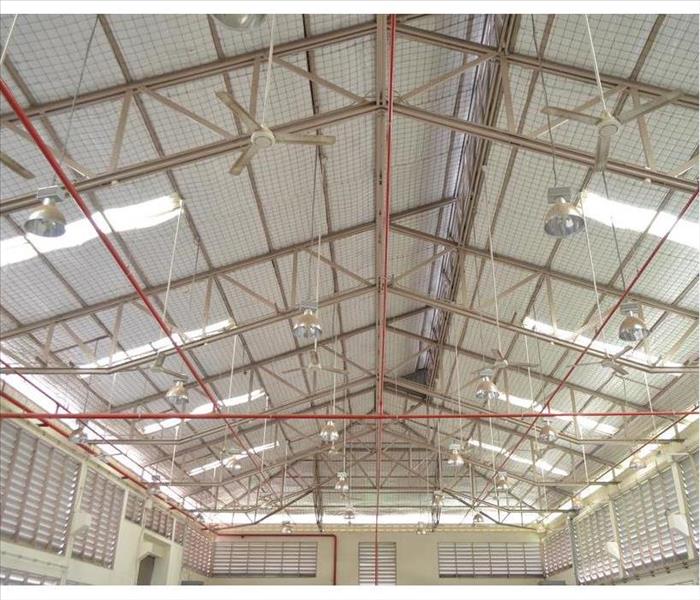How Do I Protect My Business From Fire Disaster?
10/16/2022 (Permalink)
Fire Disaster and Your Business
Fire prevention is important to any business owner. You can protect your business by installing a fire sprinkler system, having a dependable fire alarm system installed, and having fire-resistant walls and ceilings. By taking these steps and more, you can prepare your company for the worst in case of emergency.
Install a Fire Sprinkler System
You should install a fire sprinkler system in your business. Fire sprinklers are an essential part of any building and can save lives, property, and money.
If you don't have a fire sprinkler system installed in your building yet, now is the time to get one. A fire sprinkler system will allow you to sleep at night knowing that your business is protected from a costly disaster. It also makes sense financially; if there's ever a fire at your place of business, installing a fire sprinkler system now will save you money down the road by reducing insurance premiums for years to come (and sometimes permanently).
Install a Dependable Fire Alarm System
You should always have an effective fire alarm system in place to keep your business safe, especially if it’s a large or high-risk location. If you do not have one yet, install one immediately!
Types of fire alarms
There are two main types of fire alarms: manual and automatic.
Manual systems require someone to pull the lever when there is a potential threat of fire, which then triggers a call for help from local authorities and other emergency responders if necessary.
Automatic systems detect smoke or heat signatures automatically without requiring human intervention; thus, they can be more efficient at detecting fires than manual ones. However, automatic systems can be more prone to false alerts due to their sensitive technology—especially if they're older than ten years old—and may not always reach authorities quickly enough in case of emergency situations such as earthquakes that cause structural damage but not necessarily fires themselves (although these events would still qualify as emergencies).
If possible, choose an automatic system with cellular backup capabilities so that even in cases where there's no power outage due to natural disasters like hurricanes Katrina and Sandy happening nearby - which happened near New Orleans back in 2005 - it'll still get signals out through radio waves instead via Wi-Fi connections being cut off by water damage caused by flooding during those storms
Install Fire Resistant Walls and Ceilings
One of the most important things you can do to protect your business from fire disasters is to install fire-resistant walls and ceilings. Fire-resistant walls and ceilings are designed to resist or prevent the spread of flames, smoke, and hot gases. They’re also useful in containing a fire if it does get started, which gives you more time to evacuate safely.
There are several types of fire-resistant materials available for walls and ceilings:
- Gypsum board (drywall) with a plaster finish applied over it
- Plasterboard (also called gypsum board) with an integral intumescent coating
- Rock wool insulation behind drywall with an intumescent coating applied over the top layer of plasterboard (gypsum board).
Always Have a Fire Extinguisher Handy
Use a fire extinguisher when needed. Read the instructions carefully and understand how to use your fire extinguisher before you need it. Know where your extinguishers are located and that they are in good working order. Check them at least once a year, or more frequently if you have reason to believe they may need it (e.g., if they were dropped). The manufacturer's instructions will tell you how often they should be checked or serviced by a professional, but every few years is probably fine as long as you keep an eye out for any signs of wear or damage, like cracks or rust spots that could cause leaks when you try to use them—and don't forget about those visual inspections. Make sure that all staff knows where the closest fire extinguisher is located and how to properly operate it in case of emergency—and make sure everyone understands its limitations: A fire extinguisher can only prevent fires from getting worse; it cannot put out an already raging blaze.
Fire prevention and preparation can save your business from suffering heavy losses. The importance of fire prevention can not be overstated. Fire damage can be very costly; if you have a small business, it may even put you out of business. Some types of businesses are more susceptible to fires than others. For example, restaurants and bars often have grease fires due to cooking equipment or flammable liquids like alcohol used in drinks. But any type of business could suffer from a devastating fire if they don't take the proper precautions against one happening:
Hopefully, we have shown you just how important it is to take fire safety seriously. The last thing that any business owner wants is to lose everything they’ve worked for. With these tips, you can rest easy knowing that your business will be safe from fire disasters.
If your Tyler business does catch on fire, SERVPRO of Tyler is here to help you clean up the mess and get back to normal.


 24/7 Emergency Service
24/7 Emergency Service
